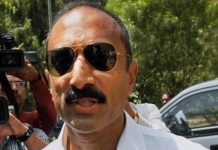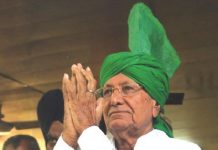Question: What is the Centre doing about this? Have the then home minister, Shivraj Patil and the then home secretary, Madhukar Gupta been asked to explain this critical lapse? D Sivanandan, in charge of the State Intelligence Department (SID) was NOT aware of any intelligence alert on an impending terrorist attack before 26/11. In a glaring systemic loophole, the committee found that the intelligence from central agencies (IB, RAWetc) is processed at the state level in the office of the Director General of Police. The State also has a senior officer whose only job it is to process intelligence, but D Sivanandan (made Police Commissioner after Hasan Gafoor) told the Pradhan Committee that despite he being the nodal authority on intelligence in the State, all central intelligence alerts went to the DGP and Commissioner of Police with NO copy marked to him. He comes to know of such alerts only if the DGP marks a copy to him. Even proceedings of the Multi Agency Centre (set up after the Kargil Review Committee submitted its report) were not marked to him. Sivanandan told the committee that the IB and the RAW should be informed that the SID Commissioner is the nodal officer for intelligence in the State. According to the Committee’s report, this is an important matter that needs immediate attention. Question: How can crucial information be left to whims and fancies of whether the DGP will or will not mark a copy to the SID? What is the use of having a state intelligence department if it does not receive terrorist-related alerts?

The Principal Secretary (Home), Maharashtra presented the Committee with copies of some circulars issued by a Desk Officer to all concerned on some such alerts between February and July 2008. The Committee was itself shocked by this and noted, “The Committee was told that under the ‘Desk Officer’ System, such circulars are directly received and processed by the concerned Desk Officer who MAY OR MAY NOT keep the higher officials informed. This is a shocking revelation of [the] working of a system that does not enable the senior most officials in Mantralaya to keep themselves briefed on the intelligence front. This state of affairs is not desirable having regard to Section 4 of the Bombay Police Act, 1951, which makes it mandatory for the Home Department to exercise superintendence of the police force throughout the State. Officers holding positions such as the Additional Chief Secretary(Home) or Secretary, Law and Order, (Home) (who is normally a senior IPS officer) cannot merely perform secretarial work of handling paper work but must take active interest in keeping under constant watch the security scenario… otherwise, the political system, as has happened after 26/11 has to pay a price. The officers can certainly not escape responsibility cast upon them by the legislators. The least that they should attempt, in the interest of the people, is to work out cooperative administrative ways of functioning, for which Mantralaya bureaucracy as well as the political system had a well-earned reputation.”
‘If the report contains information incriminating ministers and bureaucrats, it should be made public’
Nitin Gadkari, BJP President,Maharashtra
Question: How can vital intelligence be left to the mercy of desk officers? Should there be no action taken against the senior officers? Should they be getting the benefit of the doubt for a ‘reputation’ that was earned in the past? Why is CM Ashok Chavan refusing to table the report instead of taking action? Will he come under pressure if the report is made public?
 |
 |
There was enough intelligence available with the State, even if it lay neglected in various offices. While it is well known that the Taj Hotel’s name figured in various alerts and that some attempts were made to beef up the security at this venue, what is not known is that similarly, the Mumbai Police had looked at the security arrangements at the Oberoi Trident and the Leopold Café. In fact, there was a specific intelligence alert about Leopold being a possible target. The Committee has noted that, “Despite receiving as many as six alerts between August 2006 and April 2008 about the likelihood of sea route being used by the terrorists, no significant steps had been taken by the state administration/government to beef up coastal security by having regular interaction by the coast guards.” Hasan Gafoor informed the Committee that on 26/11, five police boats were patrolling the seafront. This turned out to be a lie as DCP in charge of the boats revealed that all of them were in the Worli area where an agitation had started on 24/11 against the new Worli Sea Link bridge. Critically, there were no patrol boats in the Cuffe Parade area where Kasab and his accomplices alighted from their dinghy on 26/11. Question: Why is the chief minister shielding Hasan Gafoor? Chavan went to the extent of saying that he did not agree with the Committee’s criticism of Gafoor. In its report the Committee observes that the Commissioner of Police — who stayed put at the Oberoi instead of taking over the control room — should have taken command. To quote the report, “More important, he ought to have presented himself as taking command. That was a serious lapse as much of individuals as of the system in place.”













